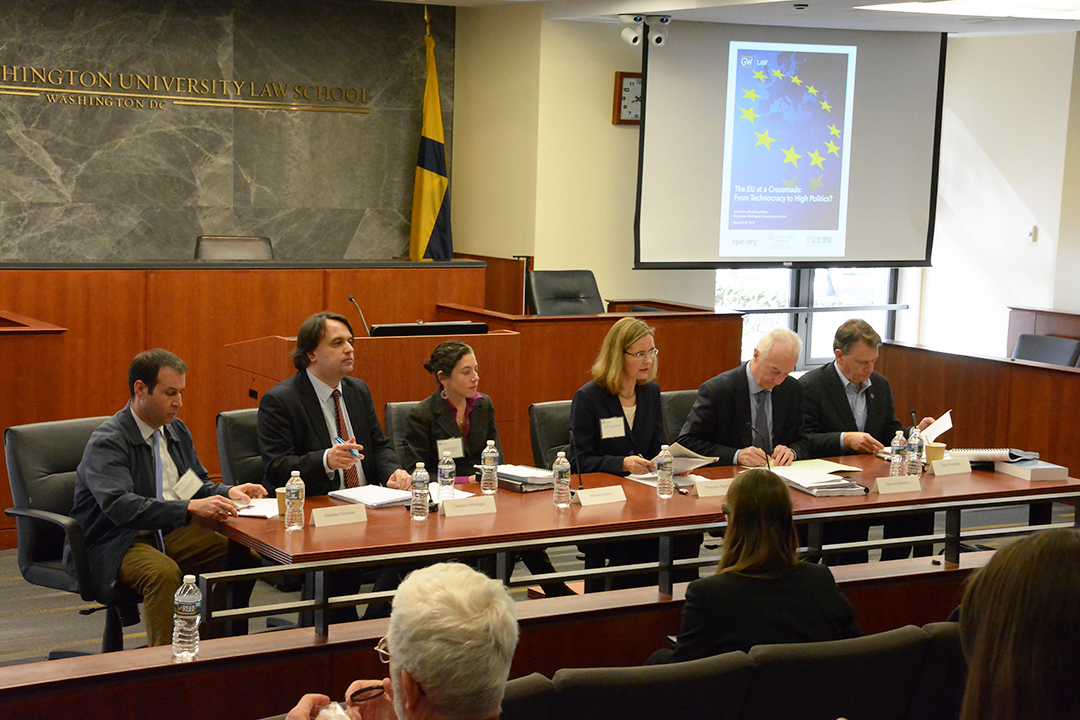Professor Francesca Bignami and GW Law hosted a two-day workshop on the future of the European Union (EU) on March 23-24. Twenty-four of the foremost scholars and policymakers in the field gathered to discuss the legal topics at the heart of the populist politics that are sweeping Europe. At the workshop, there was a strong consensus that the EU faces an unprecedented set of challenges and that it has entered a high-stakes period for its future as political union.
Renaud Dehousse, President of the European University Institute, kicked off the event with a keynote on the trajectory of EU politics since the Euro Crisis and the promise of the Spitzenkandidat process, the procedure by which elections for the European Parliament involve parties with competing candidates for the presidency of the European Commission. The rest of the workshop was devoted to the four issues that have become enormously salient with the rising tide of populism across Europe—the governance of the Eurozone, migration, national security, and the democratic deficit and backsliding.
The first panel was devoted to the law and politics of the Eurozone, with papers by Nicolas Jabko, Johns Hopkins University; Matthias Ruffert, Humboldt-Universität zu Berlin; Elliot Posner, Case Western Reserve University; Philomila Tsoukala, Georgetown University Law Center; and comments by Anna Gelpern, Georgetown Law. In many European countries, the Euro Crisis is taken as the poster child of the flaws of trade liberalization and globalization. The panelists analyzed the legal and institutional steps that were taken to avert the collapse of the euro, the fiscal discipline required of Eurozone countries, and the existing and possible forms of fiscal assistance and common budgetary policies.
The second panel focused on human migration, with comments made by Professor Bignami and papers by Philippe De Bruycker, Université Libre de Bruxelles; Dr. Niovi Vavoula, Queen Mary University of London; and Ulf Öberg, Judge at the General Court of the European Union. The fear of migration, both from other member states, and from the Middle East and Africa, has been one of biggest drivers of the current populist turn in European politics. The panelists explored the efforts that have been made in EU law to address concerns of benefit tourism and unfair labor competition. They also assessed the EU's asylum policy and the possibility of a common immigration administration in the years to come.
The third panel tackled the challenges of protecting national security in the Schengen Area, with papers by Gilles de Kerchove, EU Counter-Terrorism Coordinator; Valsamis Mitsilegas, Queen Mary University of London; Abraham Newman, Georgetown University; Marc Rotenberg, President, Electronic Privacy Information Center; and comments by Jennifer Daskal, American University Washington College of Law. The panel explored the flaws of the Schengen Area and the ongoing reform efforts to bolster cooperation among border control, counter-terrorism, and law enforcement agencies. It also analyzed the growing counter-terrorism surveillance powers of EU governments and the current state of play of the privacy vs. security debate.
The last panel and concluding roundtable discussion focused on the profound challenges to liberal democratic values posed by recent political developments in the member states. Kim Lane Scheppele, Princeton University; Bojan Bugarič, University of Ljubljana; and R. Daniel Kelemen, Rutgers University, explored the politics of authoritarian populism and the legal tools available to the EU to combat democratic backsliding. These sessions also analyzed the longstanding difficulty of creating democratic government at the EU level, with papers by Peter Lindseth, University of Connecticut School of Law, and Emilio De Capitani, Former Secretary of the European Parliament Civil Liberties. Comments were provided by Fernanda Nicola, American University Washington College of Law.


